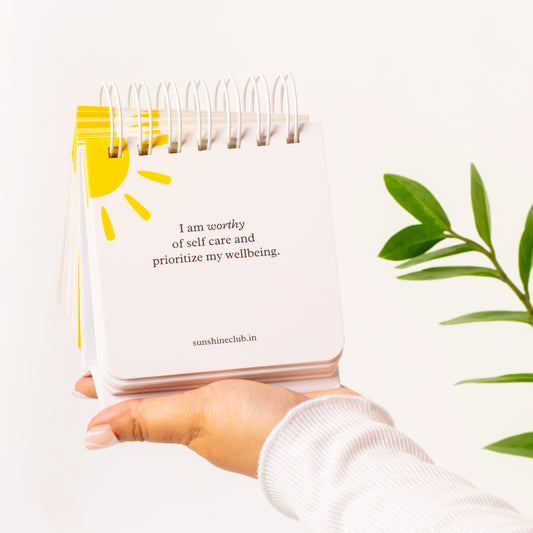
How to Manage Your Feelings for a Healthier, Happier Life
Share
We all experience a wide range of emotions—joy, sadness, anger, frustration, love, and everything in between. While emotions are a natural and necessary part of life, they can sometimes feel overwhelming. Whether it's stress at work, tension in relationships, or personal challenges, managing our emotions is essential for maintaining balance and well-being. Yet, for many, understanding how to effectively handle feelings is not always easy.
Why Is Managing Your Feelings Important?
Emotions play a critical role in our lives. They influence how we think, behave, and interact with others. When emotions are well-managed, they help us communicate effectively, build healthy relationships, and make sound decisions. However, when emotions go unchecked, they can lead to stress, misunderstandings, and emotional fatigue.
Think about a time when anger or frustration got the best of you. Perhaps it led to an argument, or maybe you said something you regretted. On the other hand, suppressing emotions can be equally damaging, leading to feelings of resentment, anxiety, or burnout. Learning to manage your feelings isn’t about denying or controlling them but understanding them so that they can be expressed in healthy and productive ways.
By learning how to recognize, process, and respond to emotions, you can build emotional resilience and improve your overall quality of life.
The First Step: Recognizing and Naming Your Emotions
The journey to managing your feelings starts with self-awareness. Many of us go through our days experiencing emotions without fully acknowledging them. We may feel irritated, but not pause to reflect on why. Or we might feel sad without taking time to explore what’s causing that sadness.
One of the most effective ways to manage your emotions is to first recognize them. Ask yourself: What am I feeling right now? Is it anger, frustration, disappointment, joy, or relief? Giving your emotions a name can help you gain a better understanding of what’s going on inside.
Don’t Judge Your Emotions—Accept Them
Once you’ve identified your emotions, the next step is acceptance. We often judge our feelings, labeling certain emotions as "bad" or "negative." For example, many of us view anger or sadness as emotions to be avoided or suppressed. However, emotions in themselves aren’t good or bad—they’re simply signals from our mind and body telling us something important.
Instead of fighting your feelings, allow yourself to experience them without judgment. Maintain a Journal and write down how you feel and why are you feeling that way.
The Power of Pausing: Responding Rather Than Reacting
In moments of intense emotion, it’s easy to react impulsively—whether it’s snapping at someone in anger or making a hasty decision out of frustration. These impulsive reactions often lead to regret or added stress. The good news is that you can avoid this by practicing the art of pausing.
When you feel a strong emotion rising, take a moment to pause before responding. This simple act of taking a deep breath or counting to ten allows you to gain clarity and choose how you want to respond. Pausing gives you space to think about what you’re feeling and why, which helps you make decisions from a calmer, more thoughtful place.
Learn to Express Your Emotions Constructively
While it’s important to acknowledge your feelings, it’s equally important to express them in a constructive way. Bottling up emotions can lead to emotional burnout, while expressing them aggressively can damage relationships.
When expressing your feelings, aim to communicate openly but calmly. Use "I" statements to take ownership of your emotions. For instance, instead of saying, "You never listen to me!" try saying, "I feel unheard when I don’t get a chance to share my thoughts." This approach prevents defensiveness in others and promotes healthy communication.
Practice Mindfulness to Stay Grounded
Mindfulness is a powerful tool for managing emotions. By bringing your awareness to the present moment, mindfulness helps you observe your feelings without getting swept away by them. It teaches you to sit with your emotions, whether pleasant or unpleasant, without judgment.
When you practice mindfulness, you become more aware of your emotional triggers and patterns. You learn to recognize when certain situations tend to stir up strong emotions and how to navigate them with greater ease. Mindfulness also encourages deep breathing, which can help calm the nervous system during moments of emotional intensity.
Incorporating mindfulness into your daily routine can be as simple as taking a few moments each day to focus on your breath, observe your surroundings, or engage in mindful movement like yoga. Regular mindfulness practice can significantly improve your emotional regulation and overall well-being.
Cultivate Emotional Resilience Through Gratitude
Gratitude is another powerful practice that can help you manage your emotions and build resilience. When we focus on what we’re grateful for, it shifts our attention away from negative emotions and brings a sense of balance and perspective.
Try incorporating gratitude into your daily life by keeping a gratitude journal. Each day, write down three things you’re grateful for, whether big or small. Over time, this practice can help you develop a more positive mindset and make it easier to handle challenging emotions when they arise.
Engage in Regular Physical Activity
It might sound surprising, but physical activity can be incredibly effective for emotional regulation. Exercise releases endorphins—natural mood boosters—that help reduce stress and improve emotional well-being. Regular physical activity, whether it’s walking, yoga, or playing a sport, also provides a healthy outlet for emotions like frustration or anxiety.
Even a short 20-minute walk can help clear your mind, reduce tension, and provide the mental space needed to process difficult emotions. Movement can also help you reconnect with your body, creating a sense of grounding when emotions feel overwhelming.
Build a Support System
Sometimes, managing your emotions means knowing when to seek support. We all need a strong support system to lean on, whether it’s friends, family, or a professional counselor. Talking about your feelings with someone you trust can help you gain clarity, feel understood, and receive valuable advice or perspective.
If you find that certain emotions are persistent or difficult to manage on your own, don’t hesitate to reach out for professional support. Therapy or counseling can provide helpful tools for emotional regulation and offer a safe space to explore your feelings in depth.
Embrace Your Emotions, Don’t Avoid Them
Managing your feelings is a lifelong process that involves self-awareness, acceptance, and deliberate action. By acknowledging your emotions, expressing them constructively, and using tools like mindfulness, gratitude, and physical activity, you can develop emotional resilience and lead a more balanced, fulfilling life.
Remember, emotions are not something to be feared or avoided. They are a natural part of the human experience and provide valuable insights into your needs, desires, and challenges. Embrace them, learn from them, and use them as a guide to create a healthier, happier version of yourself.
Taking the time to manage your feelings will not only improve your mental and emotional health but also enhance your relationships, productivity, and overall sense of well-being. So, the next time you find yourself overwhelmed by emotions, take a deep breath, pause, and remember that you have the power to manage your feelings with grace and wisdom.








